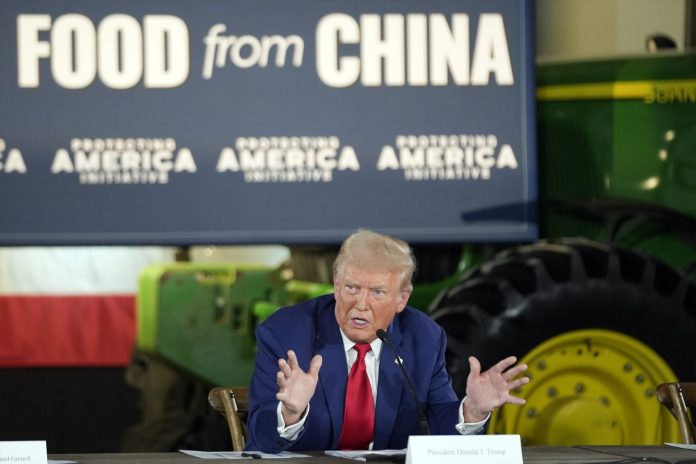
|
Only have a minute? Listen instead
Getting your Trinity Audio player ready...
|
The normally arcane topic of tariffs has become a major element in the current presidential race. The issue is significant for the Rio Grande Valley, where cross-border trade is a major part of our economy.
Former President Donald Trump, who made tariffs a hallmark of his economic policy while in office, has promised even higher levies on foreign goods if he’s elected again, and he’s used them as a threat against domestic companies as well.
Speaking at a group of farmers Monday in Smithton, Pa., he pointed out a group of John Deere tractors placed behind him as a backdrop, and noted that the company has announced plans to build a new plant in Mexico. Trump said he would impose a 200% tariff on John Deere machinery if he returns to the White House.
“If they want to build in the United States, there is no tariff,” he added.
Such a threat likely won’t influence John Deere or any other target. They’ll accept it as a cost of doing business that will be offset by less regulation and lower wage and overhead costs in Mexico.
As economists and others have pointed out, tariffs are merely added to retail prices, and thus the cost — and primarily hurt the buyers. A recent report from the Peterson Institute for International Economics predicts that Trump’s promised 60% tariffs on all goods from China and 10% duties on imports from all other countries would cost the average American household $1,700 per year in higher prices.
Vice President Kamala Harris has rightly pointed out that tariffs essentially are an added tax on U.S. consumers. It’s worth noting, however, that President Joe Biden made similar statements, but then raised many tariffs himself, although in a targeted manner; whether Harris’ actions match her words will be seen if she’s elected.
Instead of wielding a stick of threatened tariffs, officials have a better chance of keeping companies home if they show more willingness to address companies’ needs and concerns, as they have with programs like maquiladoras, which remain a mainstay here and elsewhere.
Maquiladoras continue to benefit the economies of the Valley and other border areas, and one of their features is a measure of relief from tariffs. Such incentives enable companies to maintain their financial and administrative centers in the United States while utilizing a ready, and less expensive, workforce.
A recent report from the Federal Reserve office in Dallas notes that in 2021, the maquila industry comprised 58% of Mexico’s manufacturing GDP and and 48% of the country’s industrial employment.
That’s a major consideration, as our high immigration rate remains a primary election issue. While much of our current flow of migrants comes from refugees fleeing corrupt, failed governments and rampant gangland crime, many also come seeking economic opportunity. Jobs provided at the cross-border plants could inspire workers to stay in their home countries, and help ease our immigration pressures.
Instead of bullying our business community with the threat of tariffs, officials could find more cooperation, and more economic benefits, by encouraging production rather than penalizing it.



